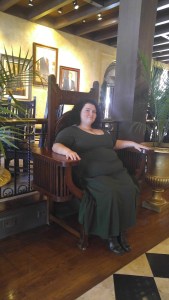President Taft was so fat he got stuck in his bathtub and it took five men to get him out.
This was never true, and the 27th POTUS was dead a half century before I was born. But the joke persisted long after his record on monopolies (good) and labor (bad) had washed out of any history curriculum I was ever taught. What endured was the body and the joke it became.
Taft’s legendary White House bathtub was a custom job, the kind of thing most of us only covet as we grow up and outgrow the kind of fixtures a Millennial can afford to rent. Pictures survive of four men lounging comfortably in Taft’s enormous luxury tub, enjoying how little of the space for his body that their bodies occupy.

On the other side of the continent, Riverside California is a grasping, ambitious little wannabe of a city. Riverside turned its historic Catholic mission into a very expensive hotel and spa with a small chain of restaurants inside. The building is stately and stuffy, picturesque stucco outside and wood paneling the color of dirty money inside. Local couples save up for a single night there for a honeymoon or special occasion; most visiting VIPs will accept accommodation nowhere else. On the ground floor, between the steakhouse and the bottomless mimosa brunches, there sits a gorgeously carved wooden chair, upholstered in dark leather and studded at the seams. Thronelike and resting in a place of pride, the upper back of it is inscribed with “President Taft’s Chair” and dated 1909, when hotel owner Frank Miller commissioned the piece of furniture to welcome the fat man who would be the fourth in office to stay in the Mission’s presidential suite. Hotel workers just call it the Big Chair, and yes, they’ll take your photo as you sit there.
I took my own in it more than once, noting how comfortable it was. The span of the arms is powerful, inviting a posture befitting a judge or a leader. The seat is as wide as it needs to be to accommodate someone the size of President Taft (rumored to have outweighed me by only twenty pounds or so) with supports that veer away from the body as they rise rather than cutting into it. The chair feels like it belongs to me as almost no other ever has, because it was built for a body like mine.
When Donald Trump was elected in 2016, my soul was filled with dread. This was largely due to his lack of character and dangerous incompetence with governance, but there was an unforeseen difficulty with his rocky and stupefying time in office. I had never before lived through the presidency of a fat man. Taft was the mold and the same jokes came to fill the cavernous space of that legendary bathtub. Mortifying photos of Trump’s wide ass landed gracelessly on the covers of magazines and in the memes shared by liberals and leftists alike. He was mocked for being too heavy to ride a hot air balloon, called an ‘obese turtle’ by a high-profile and aristocratically thin commentator, and cartoonists could not help but render him lolling and infantile, round in a diaper, chubby-cheeked and emasculated in caricature.
Was William Howard Taft a bad man? A bad president? Did he assault women, separate migrant families, let a million people die in an epidemic that he could have helped mitigate through meaningful policy? Take your finger off that Wikipedia scroll— you don’t know. Will all that Trump has done be subsumed in a half-century by his cardinal sin of fatness? I wish I could believe it will be different.
I know that sitting in Taft’s chair was an experience of comfort and contempt. I waited my turn, watching people pile into it two at a time, or scrunch themselves to one side the way that people in before-and-after photo shoots will stand in a single pant leg to make a point. I observed the folks posing with their cheeks puffed out, their t-shirts fluffed forward and filled with air like an imaginary belly. I thought about how important a person has to be to have a chair made for them to sit upon and feel at home.
When I was touring with my second novel, I remember showing up to an event at a bookstore that had a robust and well-oiled program for authors to perform. We had radio interviews scheduled, a book-stacked table for signings, and a healthy full house of people who had come to listen to writers talk to writers about writing. Looking upon the stage, I saw with that heartsink feeling that we had been set up in flimsy folding black plastic chairs. I knew the type and had experienced them before; I’d never had one betray me. But they were desperately uncomfortable and felt untrustworthy beneath me; betrayal was foretold in their every creak. When the liaison asked if there was anything they could do to help me get set, I asked if they had another chair.
I expected the following exchange to be at least a little humiliating, but the bookseller understood at once. She called for help from the back and told me they would get out the Roxane Gay chair.

Dr. Gay was on tour that year, as well. She had been there with her book before me, and brought with her a literary reputation and clout far greater than my own. The bookstore team reset the stage with a pair of matching, low, upholstered talk show chairs without arms. They were blocky and sturdy and comfortable. The interviews were cozy, intimate, and relaxed. Even the photos were good. Would they have been, if we’d been perched uncertainly in the embrace of toylike little seats? I think not.
Taft was fat his whole adult life: as an appeals court judge, as Secretary of War, as Chief Justice of the Supreme Court, and as president. All of the chairs that exist in his name date from the time of that ultimate appointment. I can only assume that until that point, he wasn’t important enough for things to change around the shape of his body. He was accommodated, as I was and as Dr. Gay was before me, by the best that people could locate and provide to suit the seat of power. That’s how important a person has to be to get a chair made for them to sit in: he has to be president. And it will still be a joke, long after the seat is vacant and the bathtub is dry.
I have lived through the fat person’s nightmare more times than I can count, but one instance stands clear in memory above all others. As a guest in a friend’s house, I sat in the straight-backed faux-pastoral wood dining chairs that all of our grandparents had– perhaps these had belonged to my friend’s progenitors once upon a time. There was no cause for alarm as I sat and unfolded my laptop, ready to begin a session of our writer’s group and drink a little grapefruit juice as casual talk became serious labor. When the chair gave out beneath me and splintered to kindling, there was no warning creak or ominous crack. It simply fell apart in an instant; I was on my back on the floor with a leg in the air, trying to recover my dignity even before I checked for bodily injury or verified what happened. I knew what had happened, everybody knew. I knew where my injury was. I stood up and looked at what was left of the chair.
I began to sputter my apologies, to offer to pay for replacement. The friend whose chair it was wouldn’t hear of it, expressing mortification and guilt as though she’d profaned a gravesite and several generations of my family were offended.
Another friend picked up the largest fragment of the cursed piece of furniture and asked, “Do you want to add this to your trophy wall with the others?”
I never loved anyone more than I adored him at that moment. I said yes, I laughed. Our host laughed. The chair went out the back door and into a pile for a bonfire. I was off the floor and the joke was not on me.
At the beginning of the first pandemic year, just ahead of the great office chair shortage, I bought myself the gift of a wide leather adjustable seat with proper support and a safety rating that includes bodies nearly twice my size. Overnight the minor aches and issues of sitting at my desk for long hours to do my job, to write, were eased. Bruises and red pressure marks disappeared from my hips and thighs. Joyous and triumphant, I shared the link with friends and even sent one as a gift to someone who is very dear to me, whose patched chair arms I could see were shiny with duct tape every time we Zoomed.
My dreams are small for someone who invents whole worlds for a living. I do not dream of becoming president. I dream about a big enough bathtub to sit in without touching both sides, and a house to put it in. I dream about going to events and restaurants and theaters without considering whether I can sit down without being punished for my body’s dimensions. I dream of my work outliving my body, of being remembered for my ideas and my contributions rather than a series of gags about my weight and the spectacle I made just passing through places like Yale and my friends’ kitchen tables without being ashamed of myself. I dream of a moderately long and mostly painless life (Taft lived to be 72) that feels like it is not entirely devoid of meaning.
Most of all, I dream of visiting the Mission Inn and calmly loading that perfect chair into the back of a truck and driving away, of putting it beneath my trophy wall and smugly occupying it whenever I wish.
It will take five men to get me out.



